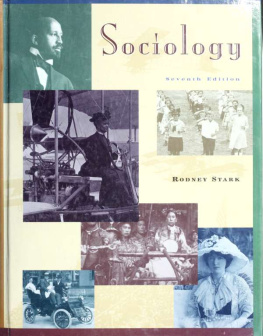The International Library of Sociology
MONTESQUIEU
Founded by KARL MANNHEIM
The International Library of Sociology
SOCIAL THEORY AND METHODOLOGY
In 22 Volumes
I | Causation and Functionalism in Sociology | Isajiw |
II | The Conditions of Social Performance | Belshaw |
III | Explanation in Social Science (The above title is not available through Routledge in North America) | Brown |
IV | From Max Weber: Essays in Sociology | Gerth and Wright Mills |
V | The Fundamental Forms of Social Thought | Stark |
VI | An Introduction to Teaching Casework Skills | Heywood |
VII | Key Problems of Sociological Theory | Rex |
VIII | The Logic of Social Enquiry | Gibson |
IX | Marx His Times and Ours | Schlesinger |
X | Montesquieu | Stark |
XI | The Nature and Types of Sociological Theory (The above title is not available through Routledge in North America) | Martindale |
XII | Oppression | Grygier |
XIII | Philosophy of Wilhelm Dilthey | Hodges |
XIV | Sentiments and Activities (The above title is not available through Routledge in North America) | Homans |
XV | A Short History of Sociology | Maus |
XVI | Sociology (The above title is not available through Routledge in North America) | Johnson |
XVII | The Sociology of Knowledge | Stark |
XVIII | The Sociology of Progress | Sklair |
XIX | The Theory of Social Change | McLeish |
XX | Understanding Human Society (The above title is not available through Routledge in North America) | Goldschmidt |
XXI | Value in Social Theory (The above title is not available through Routledge in North America) | Streeten |
XXII | Wilhelm Dilthey | Hodges |
MONTESQUIEU
Pioneer of the Sociology of Knowledge
by
WERNER STARK
First published in 1960
by Routledge
Reprinted 1998, 2001 by Routledge
2 Park Square, Milton Park, Abingdon, Oxon, OX14 4RN
Transferred to Digital Printing 2007
Routledge is an imprint of the Taylor & Francis Group
1960 Werner Stark
All rights reserved. No part of this book may be reprinted or reproduced or utilized in any form or by any electronic, mechanical, or other means, now known or hereafter invented, including photocopying and recording, or in any information storage or retrieval system, without permission in writing from the publishers.
The publishers have made every effort to contact authors/copyright holders of the works reprinted in The International Library of Sociology.
This has not been possible in every case, however, and we would welcome correspondence from those individuals/companies we have been unable to trace.
British Library Cataloguing in Publication Data
A CIP catalogue record for this book is available from the British Library
Montesquieu: Pioneer of the Sociology of Knowledge
ISBN 0-415-17511-9
Social Theory and Methodology: 22 Volumes
ISBN 0-415-17818-5
The International Library of Sociology: 274 Volumes
ISBN 0-415-17838-X
Publishers Note
The publisher has gone to great lengths to ensure the quality of this reprint but points out that some imperfections in the original may be apparent
Les causes morales forment plus le caractre gnral dune nation et dcident plus de la qualit de son esprit que les causes physiques.
Essai sur les Causes
qui peuvent affecter les Esprits
et les Caractres
I N THE PREFACE to my recent book, The Sociology of Knowledge, I expressed the hope that I had not only provided an introduction to, and reappraisal of, the subject which is known under that name, but also laid the foundations for a systematic study of its history. Indeed, I went even further: I said that I had already made a beginning to this study myself and analysed and assessed the contribution of one of its prime pioneers, the Baron de Montesquieu. My intention at that time was to incorporate this investigation of Montesquieus doctrine into a more broadly conceived work on The Origins of the Sociology of Knowledge. This plan I have now abandoned. An adequate discussion of the beginnings of the sociology of knowledge would presuppose a time-consuming search for its ultimate roots in both the empiricist and the rationalist traditions of philosophy as well as an account of at least Vico and Comte in addition to that of the Baron de la Brde. A book dealing thoroughly with this broad fieldand, needless to say, nothing but a thorough investigation would ever satisfy mewould take years to write, run to something like 600 pages and prevent me from making, for a very long time, any contribution to the more topical discussions going on in the social sciences. I have therefore decided to publish my study of Montesquieu on its own, and here it is. I intend it in all modesty to be a kind of model or rather pattern on which parallel analyses of other classical authors could be built, and I should like to express the hope that hands will not be wanting to carry on the work and provide monographs which will do for other significant figures what I have tried to do for Montesquieu. The task is not easy; the sociology of thought is, in all the earlier thinkers at any rate, intertwined with the sociology of action, and a total assessment of the extant literature, coupled with a most careful separation of what belongs to the one division of sociology and what to the other, is needed in every case to achieve a satisfactory result. But if the task is not easy, it is at the same time a pleasant one. I have enjoyed my reading of Montesquieu and my writing on him, and such work as I have done on, e.g., Vico and Comte has convinced me that they, too, have much to give to him who steeps himself in their minds and searches for their opinions on the great problems which fall within the framework of a sociology of knowledge.
The fact that I have decided to reduce my contribution to the descriptive history of the subject (which, I acknowledge, has to be put down on the debit side) is to some extent counterbalanced by some inquiries, albeit minor in scope, which I have made, or still intend to make, into other aspects. I have, for instance, tried to correct the widespread conviction that the sociology of knowledge as a whole, and not only the doctrine of ideology, is the child of revolutionary sentiment. I have shown in a lecture which I gave at Harvard in March, 1958, that there exists beside the revolutionary tradition of Voltaire and Marx also a conservative tradition which we find in such writers as Johann Gottfried Herder, the Vicomte de Bonald, and others of the pre-romantic and romantic periods. This paper is soon to appear in










